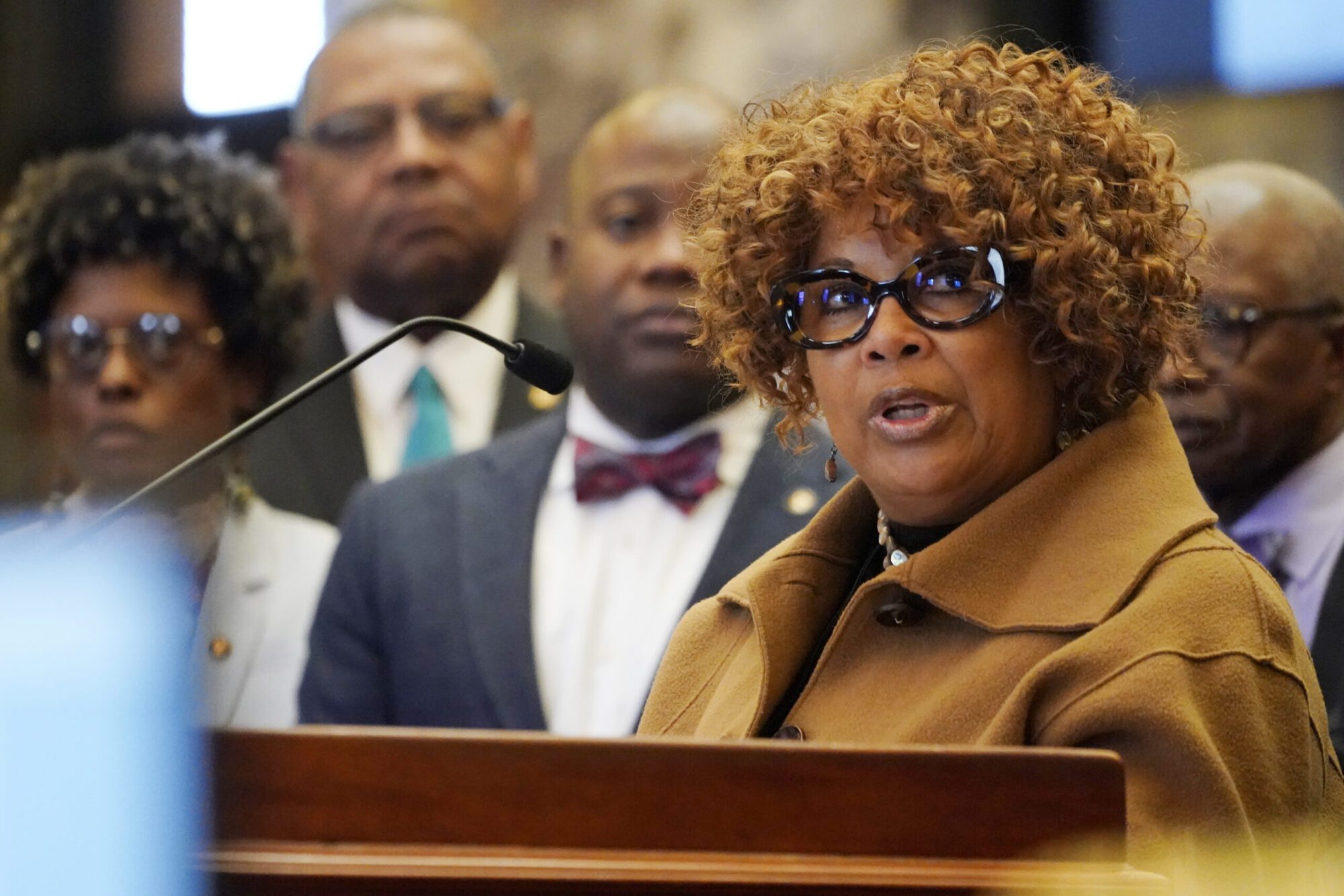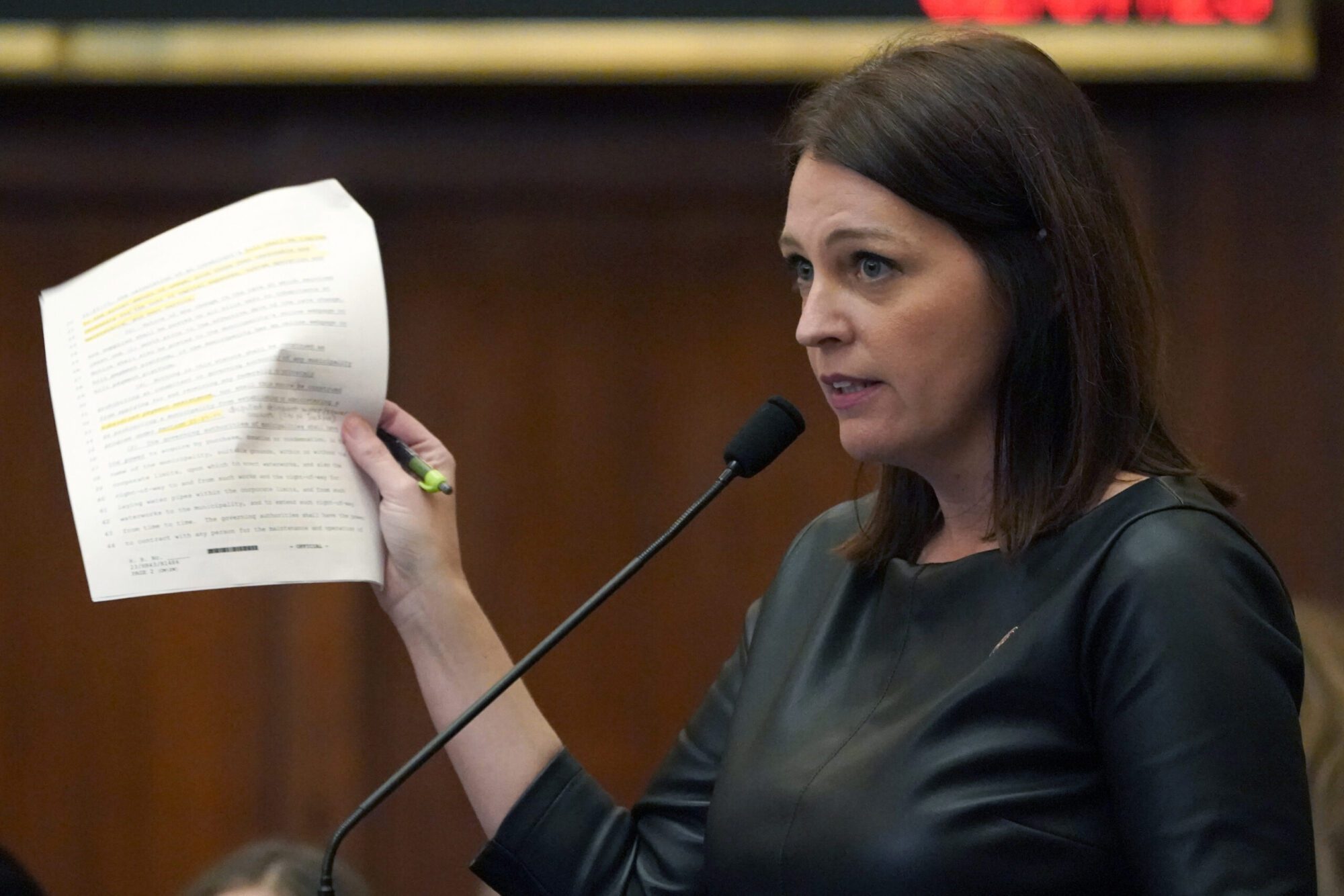
Sen. Barbara Blackmon, D-Canton, surrounded by Democratic lawmakers, speaks against legislation that would transfer ownership of the water system from the city of Jackson to a new public entity managed by a nine-member board selected by the mayor, governor and lieutenant governor, at the Mississippi Capitol, Tuesday, Feb. 7, 2023, in Jackson. The legislation passed the Senate and goes to the House. (AP Photo/Rogelio V. Solis - Copyright 2023 The Associated Press. All rights reserved.)
Metro area delegation oppose the bill, saying it’s a taking of the system by the State. It passed the Senate by a vote of 34-15.
The Mississippi Senate moved forward with a piece of legislation that would create a regional utility authority to oversee Jackson’s water system.
The bill was presented by State Senator David Parker (R). Although he represents DeSoto County, he says he has a vested interest in the city.

SB 2889 would create the Mississippi Capitol Region Utility Act. It provides for an appointed board to oversee the city’s water system.
The Mayor of Jackson will have four appointees, the largest number of appointees to the nine-member board. Two of the Mayor of Jackson’s appointees are to come in consultation with the mayors of the City of Byram and the City of Ridgeland. The Governor would appoint three members and the Lt. Governor would appoint two. All members would be subject to the consent of the state Senate.
The authority would be responsible for setting water rates and making improvements to the city’s infrastructure which includes water, sewer and storm drains.
Senators that make up the Jackson delegation expressed their opposition to the bill, saying that they were not consulted about the legislation that would effectively remove the city’s power to manage the water system.
Currently, the federal government has intervened in the city’s water system after a water crisis last fall forced the State to step in to restore operations.
A third-party manager, Ted Henefin, was appointed to run the utility and work to fix issues that have caused seemingly endless boil water notices, outages, and poor drinking water. He has presented a proposal through 2042 that would charge residents a fee for water based on their property values instead of metered usage.
The proposed plan would cap rates at $150 per month. The average amount being paid per residential property is currently $50. This rate does not include sewer and garbage collection. Commercial properties could be billed up to $600 per month.
Senator Parker said he has an appointment to meet with Henefin this month, adding that Henefin was not available until then.
Senator John Horhn (D) argued that Henefin has not had the proper amount of time to bring forth change to the system, an authority given to him by the federal government. However, Parker said the board would not go into effect until after the federal government has finished their oversight.

“It boils down to ownership of the asset [water system],” said Horhn. “Who owns this asset? It’s not the rate payers; it is owned by the City of Jackson. Without any compensation, without any consideration or consent, we are taking this asset.”
Horhn said his interpretation of the current federal order is that Henefin would have the authority to appoint what entity would control the asset as well as set a future course for the service.
“The attempt here is to try and plan for that future, instead of backing into it at the end with a less than ideal plan,” said Parker. “I’ve seen many times here where failure to act by this body has led to a greater problem.”
Horhn questioned why the solution should include taking the ownership of the system away from the City of Jackson. He referenced a debate for the control of the Jackson airport, which is under the city’s control, that began in 2016. Lawmakers attempted to allow the state to take over the municipal airport, a move which was passed, but is currently still held up in court.
Heneflin has gone on record in the last few weeks regarding the legislation, saying he believes this is a “money grab.”
Jackson is set to receive nearly $800 million in federal funding to help aid in correcting the troublesome water system. If this legislation is passed, the regional authority, not the City of Jackson, could control the appropriation of the funds once the federal government is out of the picture.
In closing remarks, Horhn said this is a very emotional and controversial topic for him and said he would like the Senate body to consult the Jackson delegation on the issue.
“Just because you can do something, doesn’t mean that you ought to. This is a situation in which we ought not do this,” said Senator Horhn, who was joined by members of the Jackson delegation at the front podium. He said the bill is simply a “taking” by the state.
Horhn closed his remarks by saying that if the state truly wanted to help Jackson it would do so in a spirit of compromise and communication.
Senator Barbara Blackmon (D) also spoke against the bill, claiming that this legislation as well as several others this year had the intent of disenfranchising a black run city and creating a new system that benefited white residents. She opened with a recent quote by Cliff Johnson of the University of Mississippi School of Law.
“I fear that white Jacksonians and leaders of Mississippi are troubled by the idea of submitting to black leadership and have undertaken to seize power and implement a system of self-governance,” she quoted.
Blackmon said that the state government of Mississippi has failed to supply support for majority black run cities and counties.
“The state is attempting the same playbook in Jackson, because the water system is a prime example of state disinvestment,” said Blackmon.
Senator Blackmon said it was only after the city filed a lawsuit and the EPA got involved in the water crisis, did things begin to be addressed.
According to reports by the Mississippi Emergency Management Agency, the state spent over $12 million on the most recent crisis in late summer of 2022. Governor Tate Reeves has gone on record to say that over the years some $150 million has been administered to the city in both federal and state funds.
Prior to the vote, Senator Parker responded to the commentary made on the bill saying that diversity will be represented on the designated board.
“We will look very closely to any and every appointment to this board to ensure that appointee would have the best interest of the city of Jackson and the rate payers as a whole in mind before they are confirmed by the body,” Parker told his colleagues.
The bill passed by a vote of 34 to 15 with three not voting. The measure also contains a reverse repealer as offered by Senator Horhn. The bill now moves to the House for consideration.











